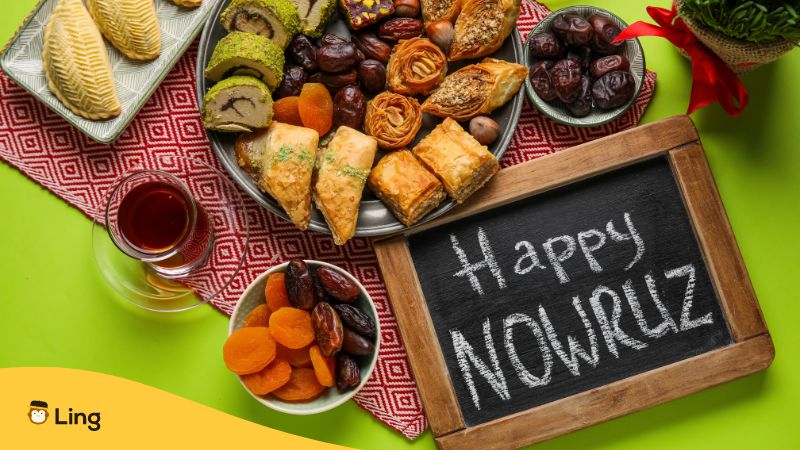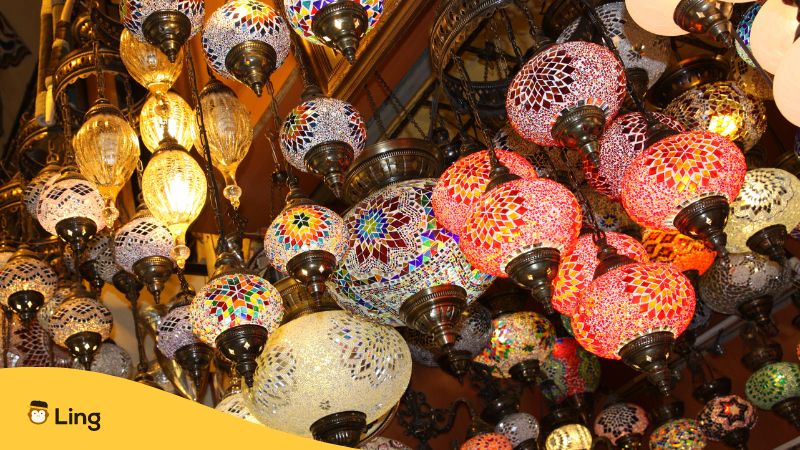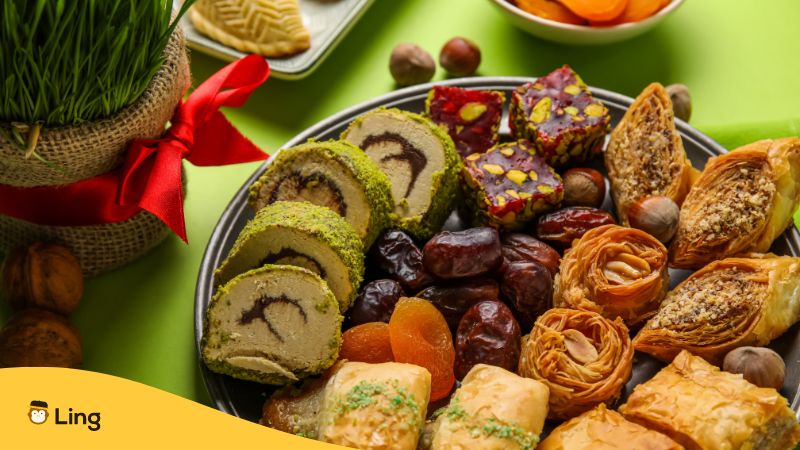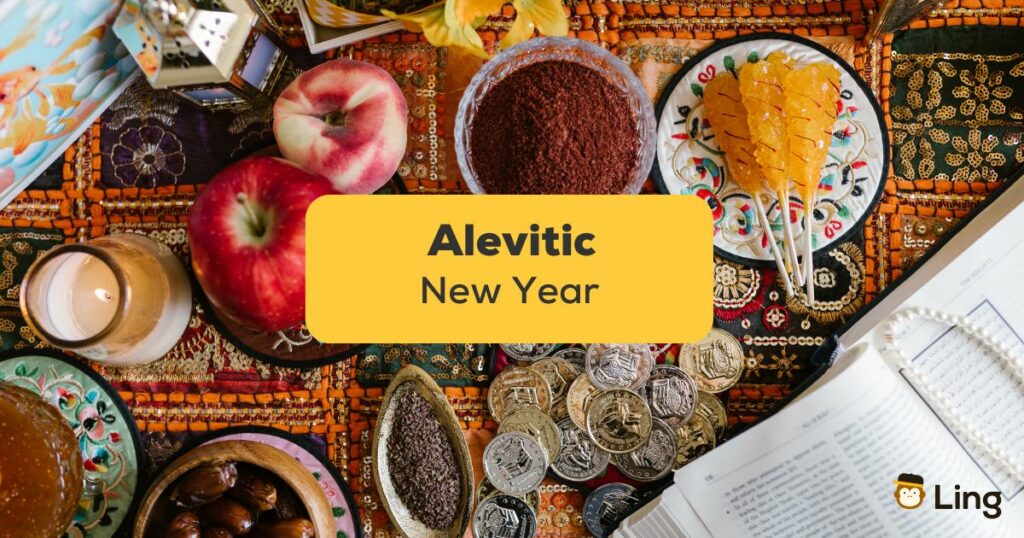Want to learn about Alevism, a mix of Shia Islam, Sufism, and Anatolian customs that’s a special part of Turkish culture? At the heart of Alevi culture is Nawroz, the Alevitic New Year, which celebrates the start of spring and brings people together for reflection and joy.
This celebration has become part of many cultures. The ancient festival has spread across Central and South Asia and is celebrated today by people from Turkey, Iran, and various other countries. As spring blooms, communities all the way from Azerbaijan to India join to start the new year with traditions and gatherings.
So, keep reading to find out some interesting facts about the Alevitic New Year while also learning some basic phrases in Turkish, Urdu, and Persian!
Who Are The Alevis?
Alevis come from different cultures and don’t focus on just one specific religious belief. Some identify with Islam, while others view Alevism as a pre-Muslim tradition. Traditionally, Alevis don’t follow the main Islamic customs like fasting or praying in mosques. Instead, they gather in cemevis for lively semah rituals, where they dance to captivating music and express their spiritual devotion. They also honor important figures like Mohammad and Ali.
Alevis have special religious ceremonies that are usually kept private. But behind closed doors, the rituals are truly amazing! They celebrate community, and everyone is welcome, regardless of their beliefs.
The Alevitic New Year: Nawroz
Alevitic New Year, or Nawroz, is celebrated on March 21, which is the first day of Spring. It’s a common holiday that holds a deep meaning to those who celebrate it, serving as a time for reflection, celebration, and communal bonding. During this special time, families and communities come together to celebrate their heritage and values through fun customs and traditions. Nawroz brings Alevis together worldwide through music, dance, and delicious food.
But Nawroz, or Nowruz, isn’t celebrated only by Alevitic communities. It’s a holy day for Zoroastrianism, Baháʼí, and some Muslim communities, and it’s also celebrated as a secular holiday in various cultures in Central Asia, the Middle East, and by Kurdish people.

Embracing Unity And Diversity
Since the community of Alevis is made up of so many people from different backgrounds, Alevis strongly believe that everyone is equal and deserves respect. Their many traditions, like semah rituals, honor Anatolian history and preserve the heritage of the Alevi community. Alevis welcome unity and diversity through language, gathering in cemevis and celebrating Nawroz together.
Navigating Family And Social Dynamics
During festive times like this public holiday, the roles and dynamics within Alevi Families are especially important. In Alevi households, elders are highly respected and valued, and their wisdom is honored by using polite language. Parents also pass on insight, teaching their children values like kindness and compassion.
In Germany, where Alevi families often live apart from each other, holding onto their cultural roots becomes even more crucial. Though Alevitic New Year is not a national holiday in Germany like a Christian Sunday observance, it’s very meaningful within Alevi communities. Families in cities like Hamburg and Berlin get together, showing how important heritage is in our diverse world.

Key Phrases And Expressions For Alevitic New Year
With the spring equinox just around the corner, Alevis everywhere are getting ready for Nawroz. With that in mind, here are some blessings and well-wishes used during Alevitic New Year in the Turkish, Urdu, and Persian languages. By learning these words, you’ll better understand this important celebration.
Turkish
| English | Turkish |
|---|---|
| May your Nawroz be blessed! | Nevruzunuz kutlu olsun! |
| Happy Nawroz holiday! | Nevruz bayramınız mübarek olsun! |
Urdu
| English | Urdu | Pronunciation (Romanized) |
|---|---|---|
| Happy Nawroz! | نوروز مبارک ہو! (Nawroz Mubarak ho!) | No-roz Moo-ba-rak ho! |
| Happy New Year! | نیا سال مبارک ہو! (Naya Saal Mubarak Ho!) | Naya Saal Moo-ba-rak Ho! |
Persian
| English | Persian | Pronunciation (Romanized) |
|---|---|---|
| May your holiday be joyous! | باشد که تعطیلات شما شاد باشد! | Baashad ke ta’a-teelaat sho-ma shaad baashad! |
| Happy new year! | سال نو مبارک! | Saal-e Now Moo-ba-rak! |

Culinary Delights Of Nawroz
Nawroz is full of symbolic traditions and rituals, and of course, food plays a major role in this as well! There are many customary dishes that are prepared during Nowruz and ingredients used in these dishes all symbolize nature and well wishes for the new year. An abundance of fresh herbs is on full display at a Nowruz feast. Interested in preparing some of these treats yourself?
Herbed Basmati Rice – Sabzi Polo
‘Sabz‘ means green in Persian. All of the green spices mixed together in this rice dish symbolize a new life and a rebirth. If prepared with care and cooked perfectly, you’re truly in for a treat!
Fresh Herb Kuku – Kookoo Sabzi
A dish that contains two symbolic Nowruz ingredients: herbs and eggs. The eggs symbolize fertility, while the green herbs represent new life. You could say it’s an embodiment of the spirit of Nowruz. It can be served with Sabzi polo and enjoyed with some bread.
Noodle Rice – Reshteh Polo
Who doesn’t love a good noodle dish? In combination with the rice, they represent well wishes and hopes for the new year!
Persian Baklava
A Nowruz party always ends with a traditional delicious treat. Persian baklava is a dessert that represents sweetness in the new year.
Ready To Celebrate The Alevitic New Year?
Did you know you can use the Ling app to learn languages like Turkish, Urdu, and Persian? This will help you understand the unity and diversity of the Alevi communities and connect more deeply with their society and practices, as well as other cultures. If you’re celebrating the Alevitic New Year and don’t want to get lost in translation, download the Ling app from the App Store or Play Store today!



































































